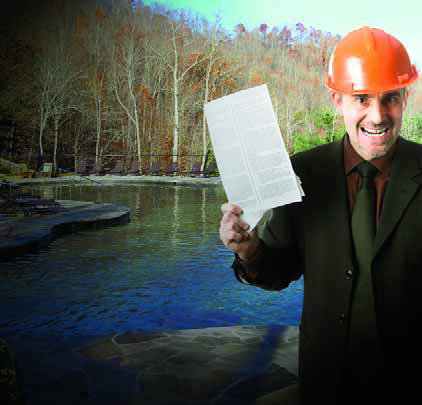Commentaries, Interviews & Profiles
I first became an admirer of Roberto Burle Marx while I was a student in landscape architecture at the University of Florida: His remarkable work, which combined a special brand of modernism with the lush potential of Brazilian settings, was incredibly powerful and the major formative influence on my own professional career. I'd learned how to draw in school and had acquired the technical skills it took to be a landscape architect, but it was seeing how Burle Marx approached his landscapes and paintings - not to mention the way he lived his life - that gave me the spark I needed to define my own approach. My personal relationship with him began soon after I graduated in 1981. I'd read an article in the Miami Herald about Burle Marx turning 70 and began writing to him in hopes he'd invite me to visit his home in Brazil. A couple of months later, I received a call from my friend Lester Pancoast, a well-known Miami architect. Burle Marx was in town and was staying as his houseguest, Pancoast explained, suggesting that since Burle Marx had a free evening I might want to take him to dinner. My future wife and I spent a nice evening with Burle Marx, who was reserved but very polite and seemed all the while to be sizing us up. After dinner, we went to Pancoast's home, where Burle Marx showed us
If you've ever designed or installed commercial swimming pools in the United States, it's likely you're well acquainted with just how strange certain health department standards (and the officials who enforce them) can be. I've discussed this topic before, of course, but it's come back to mind in powerful ways in light of a couple recent experiences I've had - incidents that illustrate the issue to near-comedic perfection. Before I climb into these oddball scenarios, let me observe first of all that, in most cases, commercial codes are based on methods rather than results - and never the twain shall meet. Second, it's my observation that the restrictions we face in our country are, as a rule, far more
If you've ever designed or installed commercial swimming pools in the United States, it's likely you're well acquainted with just how strange certain health department standards (and the officials who enforce them) can be. I've discussed this topic before, of course, but it's come back to mind in powerful ways in light of a couple recent experiences I've had - incidents that illustrate the issue to near-comedic perfection. Before I climb into these oddball scenarios, let me observe first of all that, in most cases, commercial codes are based on methods rather than results - and never the twain shall meet. Second, it's my observation that the restrictions we face in our country are, as a rule, far more
This has been a year of changes. Consider the weather, which, in my corner of the world, saw unusual, sustained periods of freezing temperatures never witnessed in my lifetime along with inconceivably low rainfall totals that make water rationing a very real possibility on southern California's horizon. Whether these climatic extremes are, as some scientists are saying, a consequence of global warming or not, the fact of the matter is that these phenomena are worrisome and their implications need to be
This has been a year of changes. Consider the weather, which, in my corner of the world, saw unusual, sustained periods of freezing temperatures never witnessed in my lifetime along with inconceivably low rainfall totals that make water rationing a very real possibility on southern California's horizon. Whether these climatic extremes are, as some scientists are saying, a consequence of global warming or not, the fact of the matter is that these phenomena are worrisome and their implications need to be
When people ask me what I do for a living, I like to tell them I'm a Texas-style maverick in the world of watershaping. That's a lighthearted way of characterizing what I do, but it speaks the truth when it comes to describing what I think this industry is really all about. Indeed, I see the best watershaping as being defined by a pioneer spirit and an appetite for innovation - a drive and hunger that convincingly overcome the all-too-common fear of trying new ideas, technologies and approaches. In my 37 years in the business, in fact, I've seen the process of shaping water change radically from what I witnessed when I started out in the 1970s. All those years of change and experience have helped me look at the art of watershaping in new ways: As have many other opened-minded artists in this business, I've
When people ask me what I do for a living, I like to tell them I'm a Texas-style maverick in the world of watershaping. That's a lighthearted way of characterizing what I do, but it speaks the truth when it comes to describing what I think this industry is really all about. Indeed, I see the best watershaping as being defined by a pioneer spirit and an appetite for innovation - a drive and hunger that convincingly overcome the all-too-common fear of trying new ideas, technologies and approaches. In my 37 years in the business, in fact, I've seen the process of shaping water change radically from what I witnessed when I started out in the 1970s. All those years of change and experience have helped me look at the art of watershaping in new ways: As have many other opened-minded artists in this business, I've
It's a statement that draws no argument: If you work hard, you should get to enjoy the fruits of your labor. For all of the obvious truth of that idea, I wonder how many of us hard-working folks in the watershaping trades take the time for those things that bring us enjoyment and a sense of reward. To be truthful, my guess is that far too many of us let the hard work get in the way of keeping promises we've made to ourselves to stop and smell the roses every now and then. Years ago, I hosted a radio program with my brother, Guy. It was called "The Good Life," and the tagline was, "The Bower Brothers sharing their enjoyment of food, wine and the good life." Neither my brother nor I were
Through the past 50 years, the watershaping industry has evolved from a small, elite group of contractors serving the needs of a small, elite group of consumers to become a vast industry whose services are in demand across a wide range of socio-economic levels. In fact, it's probably fair to say that in these most recent years of prosperity, watershapes are being sold to more people across broader economic bandwidths than ever before. Yet for all this demand and the innovation that's been happening, I don't see unity. Instead, I see a massive, diverse "industry" (definitely in quotation marks) with scores of niche organizations, geographic enclaves and specific interests, each moving forward without the



















A Master at Work